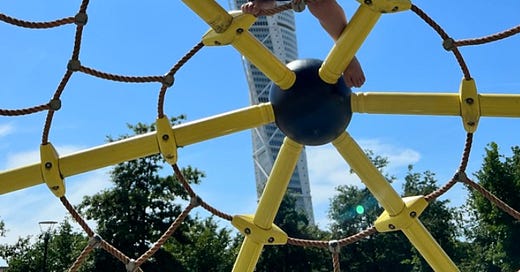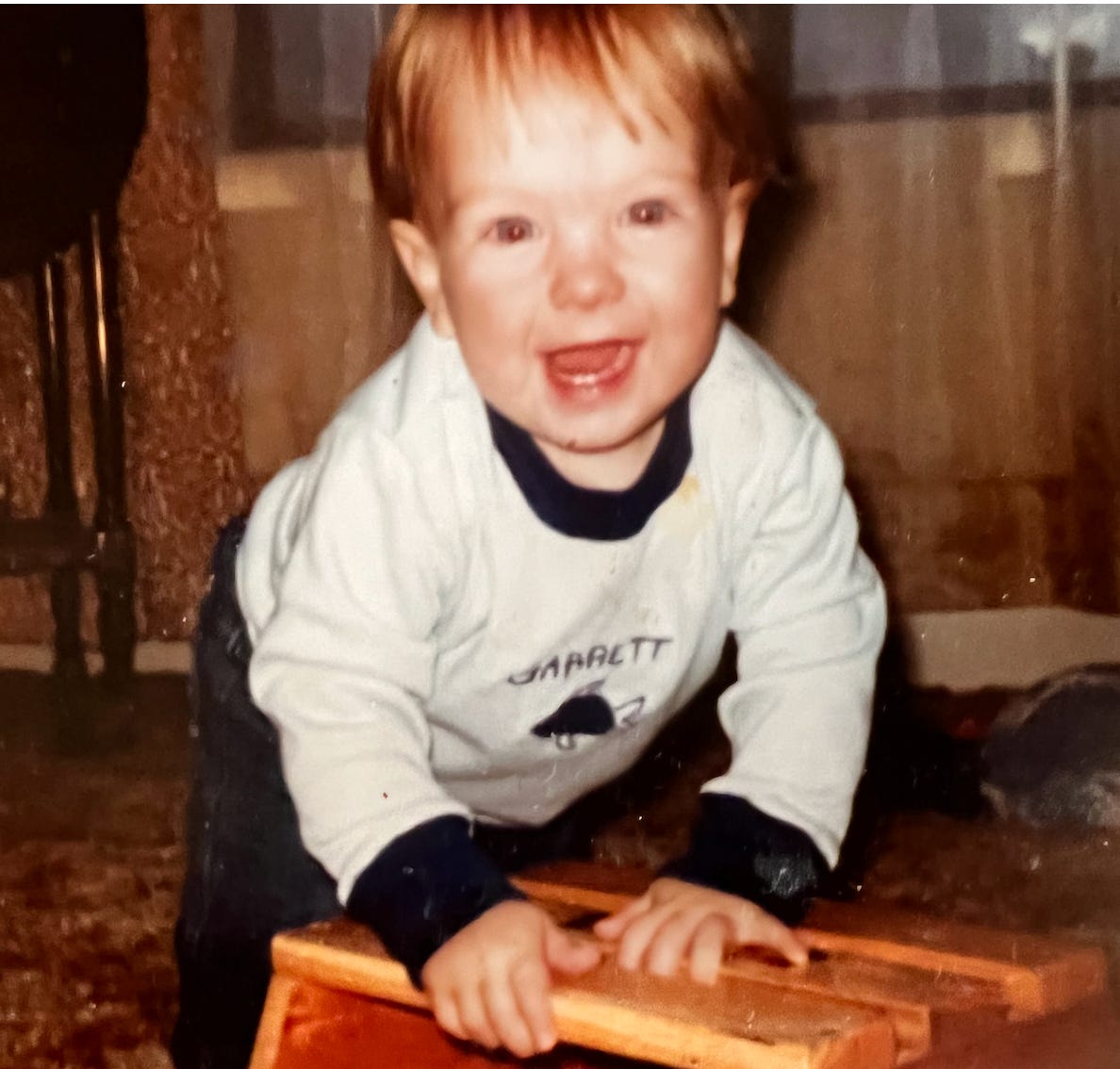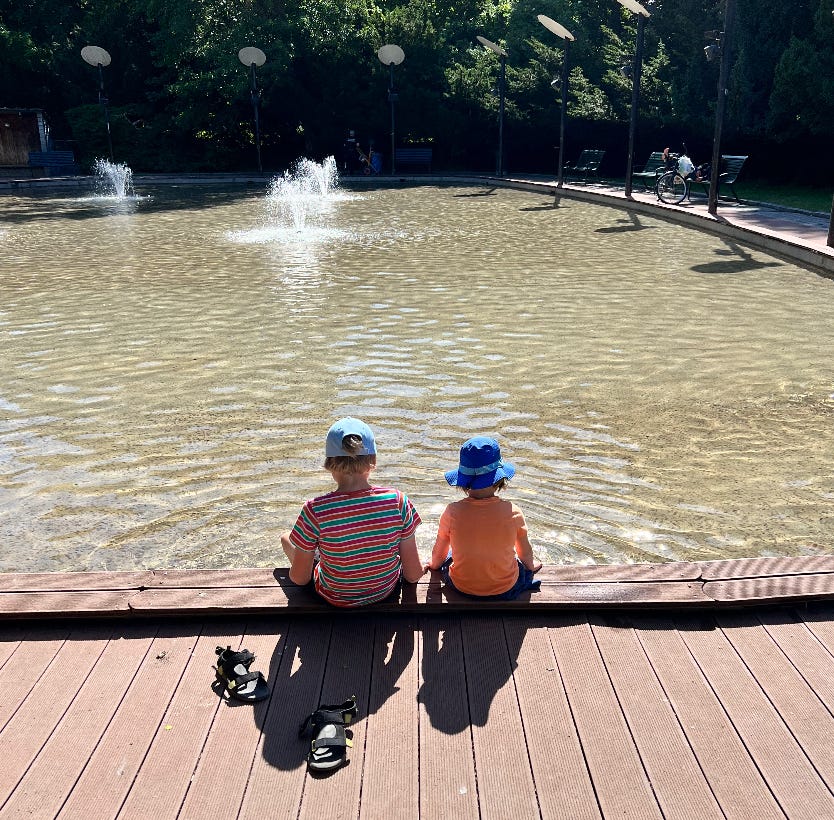Thank you, sincerely, for reading The White Pages. It means a lot to me. This newsletter is one part of the organizing I do with The Barnraisers Project (new cohorts start the week of September 12th!). It’s good, honest work that I think is useful for the world. If you agree, and especially if you’ve benefited from it, I’d love your help in keeping it going. Thanks in advance for sharing, for reaching out with reactions and, if you’re able, for becoming a paid subscriber (and/or donating a subscription for somebody else!).
Oh also: I was on the “Two Pages” podcast with Michael Bungy Stanier. I got to read from one of my favorite essays of all time, “The White Rapper Joke” (which is in Hanif Abdurraqib’s They Can’t Kill Us Until They Kill Us) and also talk about whiteness. It was fun! I think you’ll enjoy listening to it.
My kids and I have this game we like to play. It’s not especially novel or revelatory; it fits squarely into the broader category of “parentally sanctioned rough-housing.” The basic idea is that I try to remove myself from a bed or couch or similarly soft surface and they attempt to stop me from doing so. We call it “Trap Daddy." The name’s nothing to write home about either, but it’s accurate. The whole affair is an absolute mess of shouts and giggles and flailing limbs. Stuffed animals and blankets are enlisted, though their efficacy is debatable. Not to brag, but it takes more than a plush red dragon named Scarlet to hold me down.
My goal during Trap Daddy is, of course, to make sure that all participants tread that tenuous line between joy and calamity. It isn’t easy. My nine-year-old son isn’t aggressive, but he is quite large and, like his father, isn’t always aware of what direction his arms and legs are flailing. My five-year-old daughter, in turn, is both notably tiny and preternaturally fearless, capable at any point of transforming her body into a compact projectile of pure elation. The real trick to Trap Daddy is steering my daughter-missile away from the whirling thicket of my son’s appendages and onto a soft cluster of pillows. We’ve pulled it off so far, but it always feels like we’re just a few inches away from tears.
Fifteen years from now, my kids will be 24 and 20, which is to say that they will be actual real-live young adults and I won’t be able to guide either their joyful bursts forward or their semi-conscious flailing. Fifteen years from now sometimes seems like a million years from now but then I remember how quickly the previously fifteen years of life have flashed by and suddenly I’m terrified. It’s an absolutely wild variety of terror, this “oh goodness I only get so much time with these human beings while they’re young and what if I mess it all up” feeling. Some days, it doesn’t show up at all. It’s all Trap Daddy and overly-picked-over-dinners and The Official Soundtrack To The Motion Picture Encanto played on repeat. On other days, though, it’s all terror, all the time.
There’s nothing revelatory here either. This is all garden variety parent-or-guardian angst. If you are helping raise a child or if you were ever raised by other human beings who loved you, I am not telling you anything you don’t know. All I’m saying is that for one reason or another— perhaps because it’s the summer and my kids are off school so I get to spend more time with them, perhaps because this is another one of those Long Hot Summers of Destabilizing News About The World, perhaps because I’m writing a memoir and over-introspection is an official occupational hazard— I’ve been realizing more and more how little I actually know about raising moral, community-concerned human beings.
What I do know is that my son is a White boy1 growing up in a world that asks very little of White boys when it comes to caring for anybody but themselves. He is nine and breathtakingly empathetic and joyful, prone to declaring every day “the best day ever!” but is also being raised by parents who are teaching him to talk through his feelings at length and who don’t quite know what to do with those long, flailing limbs. I have no reason to believe that he won’t be thoughtful and considerate in the space he takes up, that his gift for empathy and awareness of his own emotions will come together in socially-and-interpersonally-helpful ways.
But that doesn’t mean that some days I’m not terrified.
What I also know is that my daughter is a White girl in a world that will both seek to squash her voice and full humanity while also enlisting her in the maintenance of systems and structures that deny others of their full humanity. She is five and fearless, the most hilarious and magnetic person I know, but is also being raised by parents who don’t always know the right thing to say or not say when she comes home from school with a new, Western European princess-derived theory of what it is that girls are or aren’t like. I have no reason to believe that she won’t navigate both these questions and the far-more-painful-ones still to come with more wisdom, empathy and self confidence than her parents.
But, again, that doesn’t mean that some days I’m not terrified.
This is all projection, right? I mean, you’ve already figured that out, I’m sure. I’m not actually scared of the people my children will or won’t be. I’m trying to fill their still-mostly-empty life-suitcases with a half-lifetime of my own accumulated shame, regret and insecurity.
I may say that I’m scared about whether my son will take up too much space or make too many relationships about his own comfort. What I’m really saying, though, is that I spent more of my professional career than I’d like to admit talking over both White women and women of color, that I saw jobs and institutions as vessels for my own validation and that I frequently have sought individual rewards over the collective good.
I may say that I’m scared of how my daughter navigates a world that will both push her down and encourage her to push other’s down. What I’m really saying, though, is that my wife and other White women in my life have their own full suitcase of stories of being both shoved down in a million ways by men in their lives AND about the ways that they’ve shoved themselves to the front of the line in front of Black and Brown and Indigenous folks. And, because all of this comes back to self-centered angst on my part, what I’m actually afraid of is that I’ll never stop being a bearish, patriarchal dude to all the women in my life, including my daughter, which is just one more load of shame and regret to throw on the pile.
I’m not terrified because my parents made horrendous mistakes and I’m afraid of repeating them. I’m terrified because I aspire to be as good at parenting as my own parents were. My parents, with their sprawling organic gardens and living rooms full of community-minded friends organizing together and their unceasing presence and love and support for all six (!!) of their children were literally the best models I could imagine for raising conscientious, appropriately self-assured but unselfish human beings. And still! I’ve still hurt other people! I’ve still been that White guy who assumes that every space needs his voice! I’ve still chosen a life of middle-class creature comforts rather than world transformation! After all that!
We all do this, of course. Or, at least I think we do, when our love for our kids and fear for the world and the insatiable drumbeat of ego all get jumbled up together. It isn’t just me, right? I’m not the only one who makes this theoretically deeply selfless act all about themselves?
I mean, what is last summer’s mass conservative anti-CRT crusade (or this summer’s queer panic redux) if not the primal scream of parents frightened that their woke kids’ rejection of their politics may in turn mean a rejection of them as people? How do you explain the phalanx of progressive parents who betray their purported values when they choose where to send their kids’ to school, without admitting that so many of us need our kids’ academic success as a valedictory token? Why do we ask our kids to pledge allegiance either to a flag or a copy of “A is for Activist” if we’re not hoping, somewhere deep down, to receive some cosmic reassurance that our own loyalty to those totems is, in fact, the One True Faith?
I am, as we all are, much more than the sum of my fears and shame and lowest moments. I’m doing my best in a confusing world that rarely brings out the best in any of us. And my kids aren’t pure, perfect vessels just waiting to be capsized by my fallibility. Their lives too will be full of joys and triumphs and transcendence and profound kindnesses given and received. They will also get in their own way and make dumb decisions and navigate a web of human beings all doing the same. Some days they will project themselves gleefully skyward and find safe purchase in a soft landing spot. Other days there will be collisions and tears. Sometimes others will be at fault. Sometimes they will be. Usually the answer on the end other side of the wreckage will be that it was everybody’s fault and nobody’s fault and anyway the real work will be in the rebuilding and healing.
This morning, I supervised an extremely drawn-out Lego negotiation process. At moments, I was blown away with the sophistication and consideration with which my children figured out a delicate dance of half-remembered property claims. At other moments, they fell into unnecessary, irrational and quickly forgotten arguments. Most of the time, though, it was just super mundane and boring. They really do divide the bricks up one-by-one! Do you know how many individual Lego bricks there are in an average American middle-class household in 2022? Far too many to divide up like this! And yet, they persisted.
I needed to be there, but also I didn’t. They could figure it out all by themselves except, of course, for the times they couldn’t.
Our children will, with any luck, grow up to be kinder and wiser and less selfish than us. They will have to learn the same lessons as their parents and grandparents and great-grandparents, but perhaps they’ll learn them faster and with a bit more grace. In the best possible scenario, they will delight each other enough that they realize that there is no way out of all these messes but together.
Our children’s virtue won’t save us, though. It won’t wash away our sins or serve as proof that we were actually in the right all this while. In this way, parenting is just one more verse in the same song. White guilt isn’t cleansed by the quest for Black validation. Middle-and-upper class guilt isn’t cleansed by the adoption of a pristine radical ideology. Male guilt isn’t cleansed by the smug assumption that you’re doing more housework than those other husbands.
Our children’s virtue won’t save us. Their fallibility won’t curse us. But we are lucky, all of us, parents and grandparents and aunties and uncles and cool neighbors and teachers and grown-up-friends-who-are-like-family, because by some great gift of the universe, we get to be their community for a while. Some days, they will need us to be more directive in how we navigate them through collisions and disasters. Some days we can sit and be in awe of what they’ve already figured out on their own. A lot of days, we will be bored and more-annoyed-than-we-should-be at the Madrigal family’s unconvincing but unceasing insistence that they don’t talk about Bruno. But we get to do all that together, just as we do with all the others who offer us the gift of community, the gift of a temporarily shared walk together.
This, too, isn’t about me. And that’s such beautiful news.
End notes:
This week’s song (of course!). “Mama Tried” by Merle Haggard.
Oh and here’s something new: “My favorite White Pages Community Discussion” since my last public post.
Since it’s been a few weeks since I’ve written publicly, there have been really good ones (I’ve got a soft spot for this week’s, which is about community/public institutions we love, even though it’s a bit less active) but I’ve gotta go with our most active discussion yet… “Recommend anything that isn’t a book/podcast/movie or TV show!” I owe this thread for making me laugh and smile a bunch and increasing my appreciation of alleys, the Japanese concept of forest bathing, introducing friends via group text and THRICE FRIED RICE.
While these discussions are for subscribers only, if you (a). can’t afford a subscription or (b). have already donated to Barnraisers and/or are a cohort alum, just toss me an email and I’ll add you!
When I write about both of my kids’ genders, I’m of course speaking of our and their current understanding/articulation of their gender identities. Please trust that when I say “I know my son is a White boy” or “I know my daughter is a White girl,” I hold those words and that potentially temporal/inaccurate knowledge with what I hope is an appropriate looseness.








Garrett, thank you so much for sharing this. I have so many thoughts and feelings in response but mostly, they just boil down to: I'm deeply grateful for your writing, especially when it's about children and the complexities of raising them.
This one hit home. I also have a White son and a White daughter both of whom are wonderful and kind and full of fierce social justice instincts and a love for the world, and many of these worries and fears are the ones I also sit with. Thank you for articulating them.